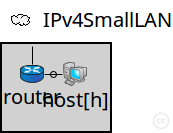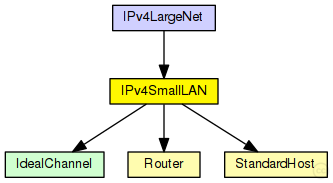 This documentation is released under the Creative Commons license
This documentation is released under the Creative Commons licenseSeveral hosts on a router; part of IPv4LargeNet.

The following diagram shows usage relationships between types. Unresolved types are missing from the diagram.

The following diagram shows inheritance relationships for this type. Unresolved types are missing from the diagram.

| Name | Type | Description |
|---|---|---|
| IPv4LargeNet | network |
A large Ethernet LAN -- see model description |
| Name | Type | Default value | Description |
|---|---|---|---|
| h | int |
number of hosts on the router |
| Name | Value | Description |
|---|---|---|
| display | i=old/cloud_s |
| Name | Direction | Size | Description |
|---|---|---|---|
| ethg | inout |
| Name | Type | Default value | Description |
|---|---|---|---|
| router.status.initialStatus | string | "UP" |
TODO @signal, @statistic |
| router.routingTable.forwarding | bool | ||
| router.routingTable.multicastForwarding | bool | ||
| router.interfaceTable.displayAddresses | bool | false |
whether to display IP addresses on links |
| router.pcapRecorder.verbose | bool | false |
whether to log packets on the module output |
| router.pcapRecorder.pcapFile | string | "" |
the PCAP file to be written |
| router.pcapRecorder.snaplen | int | 65535 |
maximum number of bytes to record per packet |
| router.pcapRecorder.dumpBadFrames | bool | true |
enable dump of frames with hasBitError |
| router.pcapRecorder.moduleNamePatterns | string | "wlan[*] eth[*] ppp[*] ext[*]" |
space-separated list of sibling module names to listen on |
| router.pcapRecorder.sendingSignalNames | string | "packetSentToLower" |
space-separated list of outbound packet signals to subscribe to |
| router.pcapRecorder.receivingSignalNames | string | "packetReceivedFromLower" |
space-separated list of inbound packet signals to subscribe to |
| router.pcapRecorder.alwaysFlush | bool | false |
flush the pcapFile after each write to ensure that all packets are captured in case of a crash |
| router.lo0.lo.interfaceTableModule | string |
The path to the InterfaceTable module |
|
| router.lo0.lo.mtu | int | 4470B | |
| router.bgp.interfaceTableModule | string |
The path to the InterfaceTable module |
|
| router.bgp.routingTableModule | string | ||
| router.bgp.ospfRoutingModule | string | hasOSPF ? "^.ospf" : "" | |
| router.bgp.dataTransferMode | string | ||
| host.status.initialStatus | string | "UP" |
TODO @signal, @statistic |
| host.routingTable.forwarding | bool | ||
| host.routingTable.multicastForwarding | bool | ||
| host.interfaceTable.displayAddresses | bool | false |
whether to display IP addresses on links |
| host.pcapRecorder.verbose | bool | false |
whether to log packets on the module output |
| host.pcapRecorder.pcapFile | string | "" |
the PCAP file to be written |
| host.pcapRecorder.snaplen | int | 65535 |
maximum number of bytes to record per packet |
| host.pcapRecorder.dumpBadFrames | bool | true |
enable dump of frames with hasBitError |
| host.pcapRecorder.moduleNamePatterns | string | "wlan[*] eth[*] ppp[*] ext[*]" |
space-separated list of sibling module names to listen on |
| host.pcapRecorder.sendingSignalNames | string | "packetSentToLower" |
space-separated list of outbound packet signals to subscribe to |
| host.pcapRecorder.receivingSignalNames | string | "packetReceivedFromLower" |
space-separated list of inbound packet signals to subscribe to |
| host.pcapRecorder.alwaysFlush | bool | false |
flush the pcapFile after each write to ensure that all packets are captured in case of a crash |
| host.lo0.lo.interfaceTableModule | string |
The path to the InterfaceTable module |
|
| host.lo0.lo.mtu | int | 4470B |
// // Several hosts on a router; part of ~IPv4LargeNet. // module IPv4SmallLAN { parameters: int h; // number of hosts on the router @display("i=old/cloud_s"); gates: inout ethg; submodules: router: Router { @display("is=s"); } host[h]: StandardHost { @display("is=s"); } connections: for i=0..h-1 { router.ethg++ <--> cable <--> host[i].ethg++; } router.ethg++ <--> ethg; }